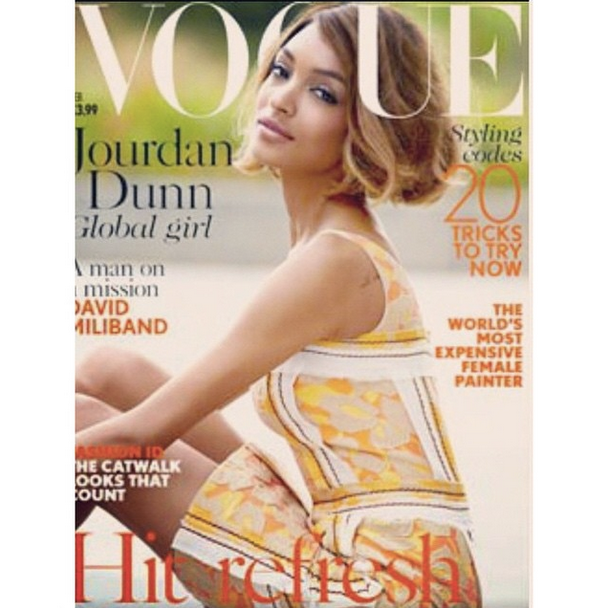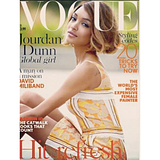Jourdan Dunn is the First Black Model on the Cover of British Vogue in 12 Years

by Evan Seymour
Supermodel Jourdan Dunn announced on her Instagram account Friday that she is the cover model for February’s issue of British Vogue. To grace the cover of a high fashion magazine is a dream come true for any model, and no is doubt a highlight in Dunn’s career. Unfortunately, it is rare for Black supermodels to get such opportunities.
Dunn is the first black person to be the sole model on the cover of the magazine since Naomi Campbell had the honor back in 2002. But British Vogue is not the only guilty party in the whitewashing of the fashion industry.
Over the years, Dunn, who was recently announced as the face of the Burberry SS15 campaign along with Naomi Campbell, has been vocal about racial discrimination in the fashion industry.
Back in 2013, Dunn sparked a bit of controversy when she took to her Twitter account to blast the racist practices of the industry. “I’m normally told I’m cancelled because I’m “coloured,” she wrote.
She addressed the issue again during an interview for her cover spread for UK Miss Vogue’s April 2014 issue. “I find it weird when agents say, ‘You’re the only black girl booked for the show. Isn’t it great?’ Why is that great? “
“I don’t know why people applaud designers for having just one ethnic model. It’s not like only one type of woman loves fashion.”
Though the decision makers in the fashion world may not have liked what Dunn had to say, their actions show that her criticism was warranted.
Last year, white models appeared on 44 of the world’s major fashion magazines five times more often than women of color. One of the notable exceptions was American Vogue. Their 2014 cover models included Rihanna, Lupita Nyong’o, Joan Smalls and Kanye West.
British Vogue has taken a completely different direction. In a BBC Radio interview last year, Alexandra Shulman, who’s been the editor-in-chief of the magazine for over twenty years, gave insight on how the publication’s models are selected.
“Vogue is a magazine about fantasy to some extent and dreams and it’s an escape from reality. People don’t want to buy a magazine like Vogue to see what they look at in the mirror. They can do that for free.”
I’d imagine that most women of color – and most women who do not look like magazine cover models– would completely disagree with Shulman’s sentiments.
Diversity is sorely needed in high fashion. It is sorely needed in television. It is sorely needed in all industries in which tokenism is the norm.
Beauty does not come in one size. It is not age restrictive. And it is not only possessed by white women.
Hopefully, Ms. Shulman will take a cue from the editors of British Vogue’s American counterpart and expand her vision of what people perceive to be female beauty. The fashion industry needs to make some serious changes. Tokenism and racism are not classics, but outdated trends that should no longer have a place in high fashion.
Photo: Instagram

No comments: